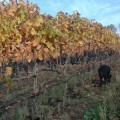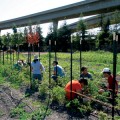While many Santa Cruz Mountain wineries eschew synthetic pesticides and fertilizers, there are only three that are certified organic. One of those is Vine Hill Winery, which recently announced that it has received organic certification from California Certified Organic Farmers (CCOF). The 2010 vintages of estate-grown pinot noir and syrah are the first of Vine Hill’s wines to bear the “organically grown fruit” on the label.
The reasons more wineries don’t pursue organic certification are varied. For some, it’s because it’s a three-year process. Other winegrowers don’t want to give up the ability to use chemicals when they want to. And some fear the perception that organic wines made without the addition of sulfites or sulfur, two common additions to wine and grapes, aren’t as good.
But Rachel Ormes, Vine Hill’s vineyard manager, is working to change those perceptions. She says environmental stewardship and education are what drove her to seek organic certification, that and better quality grapes.
“Raising awareness about organic practices is at the heart of what I do,” says Ormes. “I want to see birds. I want to see wildlife. … Part of humanity is to care for the planet that feeds us.”
When she joined Vine Hill, Ormes recognized the potential the winery’s property possessed to contribute to ecosystem health. With a complete replanting of the winery’s eight acres of vineyards under way at the time, it represented an ideal point from which to implement sustainable and organic practices in the vineyard.
With a degree from UC–Santa Cruz in agro-ecology and plant biology, as well as a personal commitment to being environmentally responsible, Ormes was ready to shepherd a new era for the viticulturally historic Vine Hill property in the Santa Cruz Mountains that dates back to the 1860s.
She’s concerned about how consumers perceive the concept of organic farming in general. “There are a number of misconceptions about the differences between organic, sustainable, biodynamic and conventional farming practices,” she explains. “I think it’s important for the organic consumer to understand that there is sustainable farming—and there is organic farming—and they are not always the same thing.”
Sustainable has no legal definition. It’s in the eye of the beholder—or the marketer. Organic is a legally defined term. CCOF certification holds farmers to a higher standard than the increasingly low bar set by the U.S. Department of Agriculture.
But ultimately the proof will be in the bottle. Ormes said the 2010 harvest produced grapes of great integrity with thick skins full of well-developed tannins and flavor. Happy, well-cared-for grapes make good wine.

 Review: Tootsies
Review: Tootsies 


